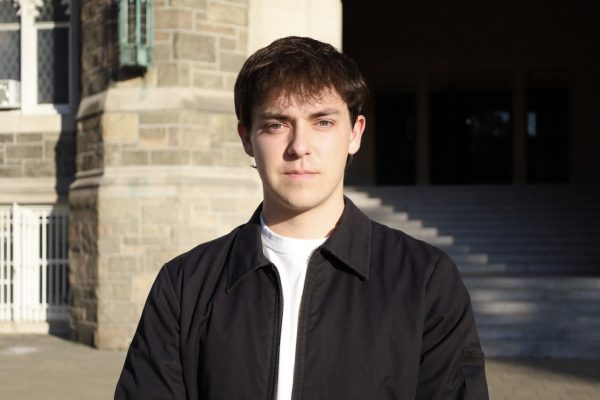As the vice president of Sustainability for Fordham University’s Rose Hill United Student Government (USG), Regina Miller, FCRH ’26, wants to prioritize environmental consciousness across campus. A double major in economics and environmental studies, Miller brings a unique mix of analytical and ecological perspectives to her role, seeing sustainability as an ethical imperative and a smart economic strategy.
“Economics is about minimizing waste and allocating resources efficiently, which is the essence of sustainability,” she explained. “The most sustainable option is often the most economically sound choice — it just takes some foresight to recognize the long-term savings.”
Growing up in her hometown of Wethersfield, Connecticut, Miller’s passion for environmental advocacy was sparked by a childhood spent gardening, kayaking and enjoying snow days. Observing less snow each year instilled in her a sense of urgency about climate change. “Growing up, I was very much an outdoorsy kid,” she recalled. “I’ve noticed changes — like fewer snow days each year — that made me realize the environment is something we need to protect.” This interest only deepened in high school, where she joined the “green team” and learned about the science behind climate change. When she arrived at Fordham, joining USG’s Sustainability Committee was a natural next step.
As vice president, Miller oversees various initiatives to make sustainability a part of Fordham’s campus culture.“I want the student body to know more about sustainability at Fordham, so I’m hoping to have more events that give everyone the opportunity to voice their concerns and learn about Fordham’s sustainable initiatives,” she said. This includes collaborating with other clubs and offices to foster a sense of community around environmental issues. For Miller, collaboration is key. “Building a community that cares about sustainability is what will lead to real improvements,” she said.
Among the initiatives under Miller’s leadership is Fordham Flea, a pop-up thrift store encouraging students to embrace secondhand shopping as a sustainable alternative to fast fashion. Miller sees Fordham Flea as a way to show students that sustainability can be accessible and impactful. “People think of Fordham Flea as a fun pop-up, but it’s also a big part of our mission to reduce waste on campus,” she explained. The initiative has become one of the committee’s signature events, engaging students who may not otherwise participate in sustainability efforts.
Miller is also working on policy proposals, which she admits can be challenging due to the slow pace of approval processes. Her team is currently advocating for an industrial composting program, which would allow Fordham to divert food waste from landfills. “Yes, it’s a big upfront cost, but if you think about the environmental impact and the potential savings on waste management, it’s worth it,” she argued. A similar proposal was submitted years ago but ultimately stalled. Miller and her team are investigating why that effort fell short, aiming to avoid similar pitfalls. “We’re packaging the proposal in a way that we hope resonates with the administration,” she said, noting that they’ve developed multiple budget options to improve its chances of being implemented.
Beyond specific projects, Miller hopes to shift how Fordham students view sustainability from an abstract concept to an accessible, daily practice. Her academic background in economics gives her a unique perspective on sustainability as a practical choice that benefits everyone rather than a moral obligation. “A lot of people think being eco-friendly is expensive, but sustainable choices often save money in the long run,” she points out. One of her favorite classes, “Environmental Economics,” taught her how closely the two fields are connected. “It’s about making choices that pay off later,” she said.
In the meantime, Miller’s focus remains on doing meaningful work, regardless of the recognition it brings. “I don’t care who gets the credit, as long as the work gets done,” she said. For her, the ultimate goal is to create lasting change, building a campus where sustainability is not only a buzzword but a shared value. “As long as one person learns something new about sustainability, I feel it’s worth it.”








































































































































































































